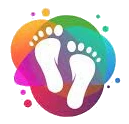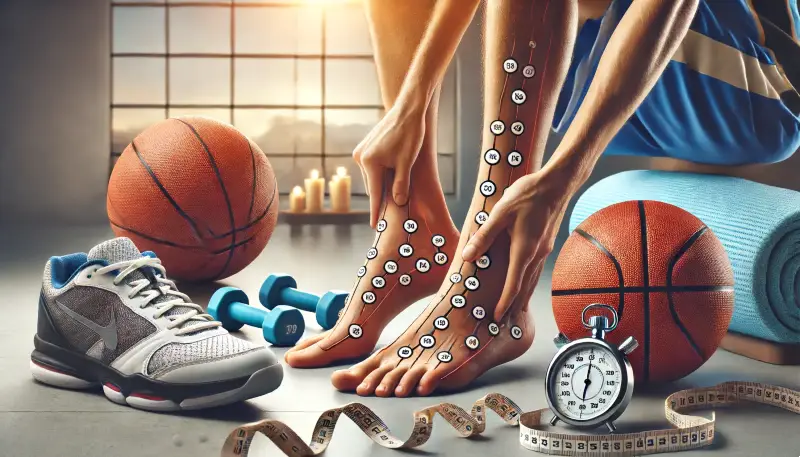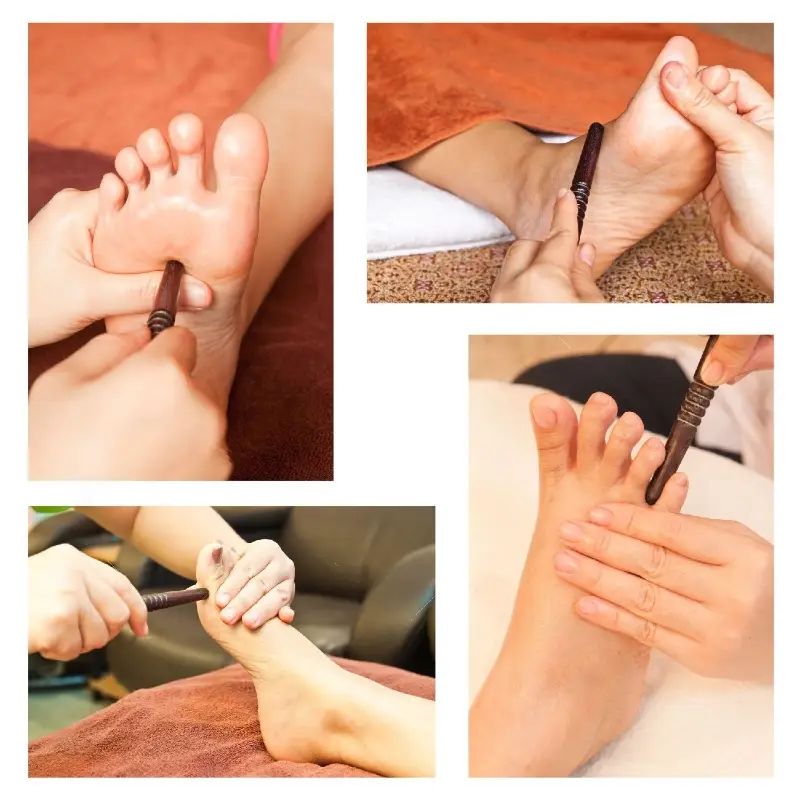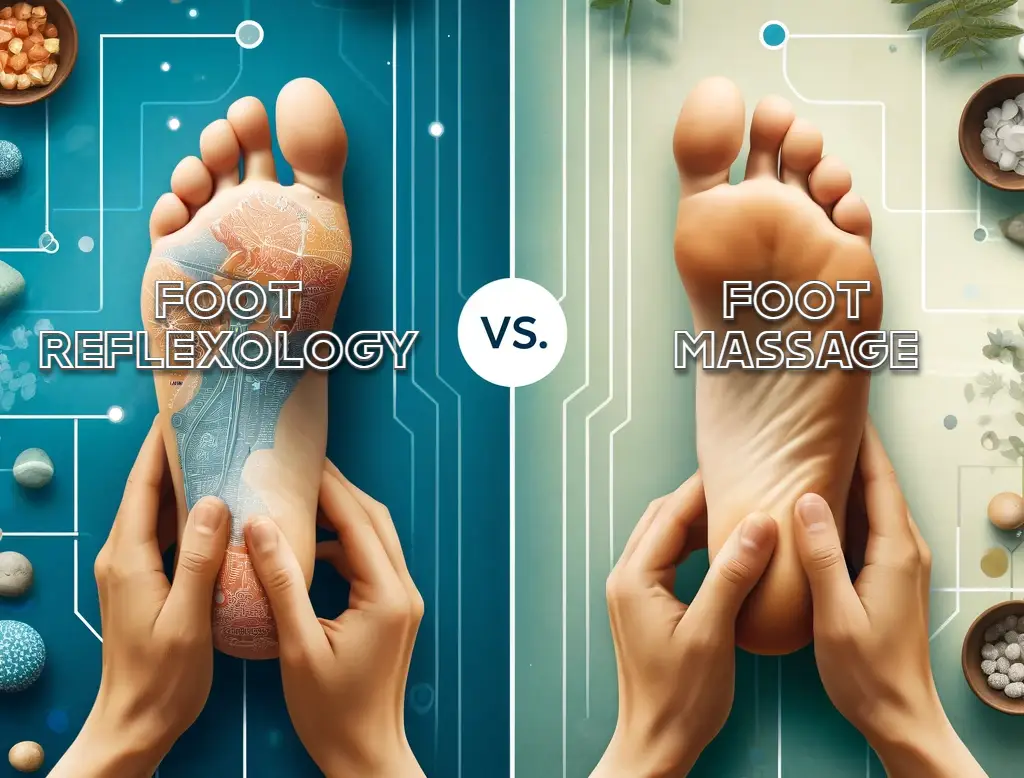- Definition: Foot reflexology for athletes involves applying pressure to specific points on the feet. Each point corresponds to different organs and bodily functions.
- Historical Background: The practice has ancient roots and has been used across various cultures for thousands of years.
- Purpose: The goal is to promote better health and wellness by stimulating these points.
- Benefits for Athletes: For athletes, reflexology can lead to faster recovery, improved performance, and reduced risk of injuries.
This section introduces reflexology’s basics and its specific benefits for athletes, setting the stage for deeper exploration into how it aids athletic performance and recovery.
Section 2: Enhancing Recovery with Reflexology
- Muscle Recovery: Foot reflexology for athletes helps muscles relax and recover after intense activity by improving blood flow, which brings more oxygen and nutrients needed for repair.
- Improved Circulation: Enhanced circulation from reflexology aids in faster removal of waste products like lactic acid, reducing soreness and speeding up recovery times.
- Reduction in Injury Recovery Time: By supporting overall body functions, reflexology can also shorten the time needed to recover from injuries, getting athletes back in action sooner.
This section highlights how foot reflexology for athletes can be a powerful tool in an athlete’s recovery process, not just aiding in quicker rehabilitation but also enhancing the body’s natural healing capabilities.
Section 3: Reflexology for Performance Enhancement
- Energy and Endurance: Regular reflexology sessions can help enhance an athlete’s energy levels and endurance by stabilizing energy flows across the body, which is vital during both training and competition.
- Focus and Mental Clarity: The calming effect of reflexology on the nervous system can significantly improve mental focus and clarity, helping athletes stay sharp and strategic during their performances.
- Flexibility and Mobility: Reflexology can also improve flexibility and reduce stiffness by increasing blood flow to the limbs, which helps prevent injuries and improves overall mobility.
This section outlines how Foot reflexology for athletes not only aids in recovery but also actively enhances various aspects of athletic performance, contributing to better results and fewer injuries.
Section 4: Real-life Success Stories
Reflexology has transformed the athletic careers of many, from seasoned professionals to enthusiastic amateurs. Here are some powerful success stories:
Real-life Success Story: Mark’s Journey with Reflexology
Mark T., a semi-professional marathon runner, struggled with recurring ankle sprains and foot soreness which hindered his training schedules and performance. Desperate for a solution that didn’t involve more medications, he turned to reflexology. After just a few sessions, Mark noticed a significant improvement in his recovery times and less discomfort during runs.
His reflexologist focused on specific points that addressed his circulation and muscle tension, leading to better endurance and fewer injuries. Inspired by these results, Mark has made reflexology a staple in his training regime, and credits it with not only enhancing his athletic performance but also his overall well-being.
Real-life Success Story: Emma’s Breakthrough with Reflexology
Emma W., a professional basketball player, faced ongoing issues with fatigue and leg cramps, which significantly affected her game. After incorporating reflexology into her routine, she experienced a notable change.
The targeted pressure points in her feet not only alleviated the cramps but also improved her energy levels during games. Emma attributes her improved stamina and reduced recovery times to regular reflexology sessions, emphasizing how this holistic approach has been crucial in maintaining her performance throughout the basketball season.
Expert Endorsements: Sports therapists and coaches discuss the integration of reflexology into their training regimens, highlighting specific instances where athletes achieved noticeable improvements in flexibility and stress management.
These real-life examples provide compelling evidence of how reflexology can be a game-changer in the sports field, offering a unique blend of health benefits and performance enhancement.
Section 5: Insights from Reflexology Experts Featuring Lisa Campbell
Lisa Campbell, a renowned reflexologist based in Henderson, Auckland, brings a wealth of knowledge and expertise to the field of reflexology, particularly in supporting women and children’s health. Her approach combines traditional reflexology techniques with a deep understanding of anatomy and physiology, ensuring each session is tailored to the athlete’s specific needs.
- Professional Techniques: Lisa uses a combination of reflexology and Indian head massage to enhance relaxation and recovery, focusing on areas that support athletic performance such as energy flow and muscle relaxation.
- Therapeutic Benefits: According to Lisa, reflexology isn’t just about physical health; it plays a crucial role in mental and emotional well-being, helping athletes manage stress and improve focus.
- Recommendations from Coaches: Sports coaches who have worked with Lisa commend her ability to adapt her sessions to the unique demands of sports, noting significant improvements in athletes’ recovery times and overall performance.
For more details or to book a session with Lisa, visit The Reflexologist.
Section 6: Practical Guide for Athletes
Incorporating foot reflexology into your athletic routine can be straightforward and highly beneficial. Here’s how you can do it:
- Regular Sessions: Aim for regular reflexology sessions, especially after intense training or competitions. This helps maintain optimal recovery and performance levels.
- Self-Reflexology Techniques: Learn some basic reflexology techniques you can perform on yourself. This can be particularly useful when professional sessions aren’t available.
- Choose the Right Reflexologist: Look for a certified reflexologist with experience in sports therapy. Lisa Campbell, for example, combines reflexology with techniques that target specific athletic needs.
- Integrate with Other Therapies: Complement reflexology with other recovery methods like physiotherapy, stretching, and proper nutrition for holistic health.
- Listen to Your Body: Pay attention to how your body responds to reflexology and adjust the frequency and intensity of your sessions accordingly.
By following these steps, athletes can seamlessly integrate reflexology into their training routines, maximizing the benefits for both performance and recovery.
Conclusion
Foot reflexology offers a unique blend of physical, mental, and emotional benefits that can significantly enhance an athlete’s recovery and performance. From reducing muscle soreness and improving circulation to boosting mental clarity and focus, the advantages are manifold. By incorporating reflexology into their regular routines, athletes can gain a competitive edge and ensure their bodies are in peak condition. For those looking to explore the benefits further, consider booking a session with a qualified reflexologist like Lisa Campbell, who specializes in tailoring reflexology techniques to meet the specific needs of athletes.
Book A Session
To experience the benefits of foot reflexology, visit Reflexology Auckland and book your session today.
Foot reflexology for athletes isn’t just a relaxing foot massage; it’s a strategic tool that can significantly boost performance and recovery. This technique involves pressing specific points on the feet, each linked to different parts of the body, to enhance overall physical and mental well-being.
Whether you’re looking to speed up recovery after intense workouts, reduce muscle soreness, or sharpen your focus for competitions, reflexology offers a unique approach to achieving athletic excellence. Let’s explore how integrating this ancient practice into your routine can give you a competitive edge.
Key Sections of Foot Reflexology For Athletes
Section 1: What is Foot Reflexology?
- Definition: Foot reflexology for athletes involves applying pressure to specific points on the feet. Each point corresponds to different organs and bodily functions.
- Historical Background: The practice has ancient roots and has been used across various cultures for thousands of years.
- Purpose: The goal is to promote better health and wellness by stimulating these points.
- Benefits for Athletes: For athletes, reflexology can lead to faster recovery, improved performance, and reduced risk of injuries.
This section introduces reflexology’s basics and its specific benefits for athletes, setting the stage for deeper exploration into how it aids athletic performance and recovery.
Section 2: Enhancing Recovery with Reflexology
- Muscle Recovery: Foot reflexology for athletes helps muscles relax and recover after intense activity by improving blood flow, which brings more oxygen and nutrients needed for repair.
- Improved Circulation: Enhanced circulation from reflexology aids in faster removal of waste products like lactic acid, reducing soreness and speeding up recovery times.
- Reduction in Injury Recovery Time: By supporting overall body functions, reflexology can also shorten the time needed to recover from injuries, getting athletes back in action sooner.
This section highlights how foot reflexology for athletes can be a powerful tool in an athlete’s recovery process, not just aiding in quicker rehabilitation but also enhancing the body’s natural healing capabilities.
Section 3: Reflexology for Performance Enhancement
- Energy and Endurance: Regular reflexology sessions can help enhance an athlete’s energy levels and endurance by stabilizing energy flows across the body, which is vital during both training and competition.
- Focus and Mental Clarity: The calming effect of reflexology on the nervous system can significantly improve mental focus and clarity, helping athletes stay sharp and strategic during their performances.
- Flexibility and Mobility: Reflexology can also improve flexibility and reduce stiffness by increasing blood flow to the limbs, which helps prevent injuries and improves overall mobility.
This section outlines how Foot reflexology for athletes not only aids in recovery but also actively enhances various aspects of athletic performance, contributing to better results and fewer injuries.
Section 4: Real-life Success Stories
Reflexology has transformed the athletic careers of many, from seasoned professionals to enthusiastic amateurs. Here are some powerful success stories:
Real-life Success Story: Mark’s Journey with Reflexology
Mark T., a semi-professional marathon runner, struggled with recurring ankle sprains and foot soreness which hindered his training schedules and performance. Desperate for a solution that didn’t involve more medications, he turned to reflexology. After just a few sessions, Mark noticed a significant improvement in his recovery times and less discomfort during runs.
His reflexologist focused on specific points that addressed his circulation and muscle tension, leading to better endurance and fewer injuries. Inspired by these results, Mark has made reflexology a staple in his training regime, and credits it with not only enhancing his athletic performance but also his overall well-being.
Real-life Success Story: Emma’s Breakthrough with Reflexology
Emma W., a professional basketball player, faced ongoing issues with fatigue and leg cramps, which significantly affected her game. After incorporating reflexology into her routine, she experienced a notable change.
The targeted pressure points in her feet not only alleviated the cramps but also improved her energy levels during games. Emma attributes her improved stamina and reduced recovery times to regular reflexology sessions, emphasizing how this holistic approach has been crucial in maintaining her performance throughout the basketball season.
Expert Endorsements: Sports therapists and coaches discuss the integration of reflexology into their training regimens, highlighting specific instances where athletes achieved noticeable improvements in flexibility and stress management.
These real-life examples provide compelling evidence of how reflexology can be a game-changer in the sports field, offering a unique blend of health benefits and performance enhancement.
Section 5: Insights from Reflexology Experts Featuring Lisa Campbell
Lisa Campbell, a renowned reflexologist based in Henderson, Auckland, brings a wealth of knowledge and expertise to the field of reflexology, particularly in supporting women and children’s health. Her approach combines traditional reflexology techniques with a deep understanding of anatomy and physiology, ensuring each session is tailored to the athlete’s specific needs.
- Professional Techniques: Lisa uses a combination of reflexology and Indian head massage to enhance relaxation and recovery, focusing on areas that support athletic performance such as energy flow and muscle relaxation.
- Therapeutic Benefits: According to Lisa, reflexology isn’t just about physical health; it plays a crucial role in mental and emotional well-being, helping athletes manage stress and improve focus.
- Recommendations from Coaches: Sports coaches who have worked with Lisa commend her ability to adapt her sessions to the unique demands of sports, noting significant improvements in athletes’ recovery times and overall performance.
For more details or to book a session with Lisa, visit The Reflexologist.
Section 6: Practical Guide for Athletes
Incorporating foot reflexology into your athletic routine can be straightforward and highly beneficial. Here’s how you can do it:
- Regular Sessions: Aim for regular reflexology sessions, especially after intense training or competitions. This helps maintain optimal recovery and performance levels.
- Self-Reflexology Techniques: Learn some basic reflexology techniques you can perform on yourself. This can be particularly useful when professional sessions aren’t available.
- Choose the Right Reflexologist: Look for a certified reflexologist with experience in sports therapy. Lisa Campbell, for example, combines reflexology with techniques that target specific athletic needs.
- Integrate with Other Therapies: Complement reflexology with other recovery methods like physiotherapy, stretching, and proper nutrition for holistic health.
- Listen to Your Body: Pay attention to how your body responds to reflexology and adjust the frequency and intensity of your sessions accordingly.
By following these steps, athletes can seamlessly integrate reflexology into their training routines, maximizing the benefits for both performance and recovery.
Conclusion
Foot reflexology offers a unique blend of physical, mental, and emotional benefits that can significantly enhance an athlete’s recovery and performance. From reducing muscle soreness and improving circulation to boosting mental clarity and focus, the advantages are manifold. By incorporating reflexology into their regular routines, athletes can gain a competitive edge and ensure their bodies are in peak condition. For those looking to explore the benefits further, consider booking a session with a qualified reflexologist like Lisa Campbell, who specializes in tailoring reflexology techniques to meet the specific needs of athletes.
Book A Session
To experience the benefits of foot reflexology, visit Reflexology Auckland and book your session today.



